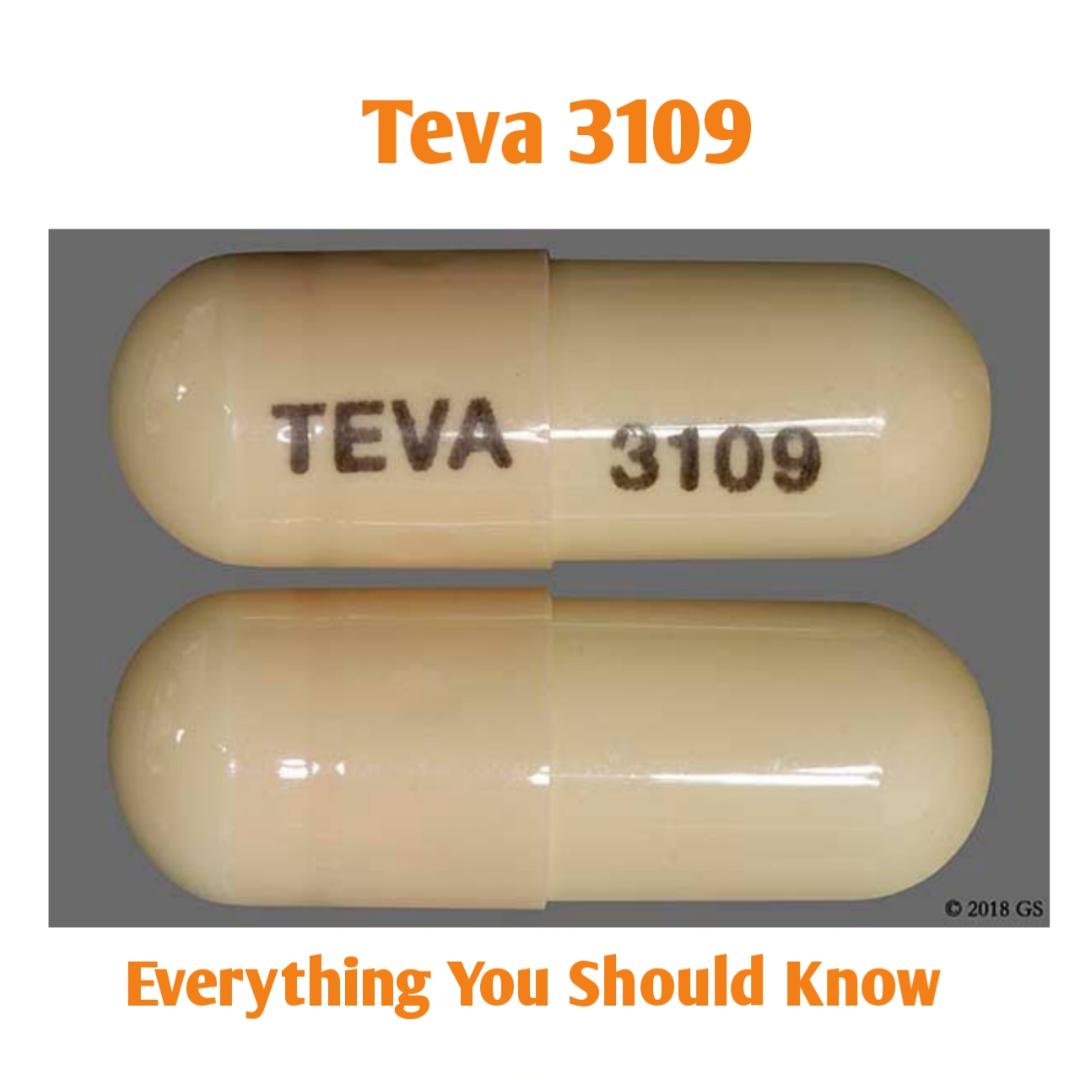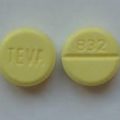The pill with imprint TEVA 3109 is Beige, Capsule-shaped and has been identified as Amoxicillin 500 mg. It is supplied by Teva Pharmaceuticals USA. Amoxicillin is used in the treatment of bacterial infection; bacterial endocarditis prevention; anthrax prophylaxis; actinomycosis; lyme disease, erythema chronicum migrans and belongs to the drug class aminopenicillins.
Amoxicillin 500 mg is not a controlled substance under the Controlled Substances Act (CSA). Doctors prescribe amoxicillin to treat infections caused by bacteria that are sensitive to the drug, including E. coli, staphylococcus, streptococcus, H. influenzae, and H. pylori. Your doctor may prescribe Teva 3109 to treat infections of the skin, throat, ears, nose, stomach, lungs, and urinary tract infections (UTI). However, the drug will not work against infections caused by viruses such as cold and flu.
Teva 3109 Warnings
It’s important to know that once you start a course of Teva 3109, you should finish the whole course. Do not stop taking Teva 3109, even if you feel better; instead, finish your entire prescription. Not treating your infection completely can make it come back stronger. Stopping Teva 3109 pill too soon can also lead to bacteria that are resistant to it.
People refer to antibiotic-resistant bugs as multidrug resistant bacteria or “superbugs.” Antibiotic resistance is a growing threat worldwide. It’s also important to understand that Teva 3109 capsule may cause a severe reaction called anaphylaxis if you are allergic to it. This reaction, which can be life-threatening, includes hives, swelling of your throat, and difficulty breathing.
Teva 3109 capsule can interfere with certain types of birth control pills. Women who are using birth control pills should talk to their doctor before taking Teva 3109.
Always tell your doctor if you have allergies to any medications, especially to antibiotics. Let your doctor know about all medications, vitamins, and supplements you are taking. Using Teva 3109 pill can be risky if you have certain conditions, so let your doctor know if you have:
- Allergies
- Kidney disease
- Liver disease
- Mononucleosis
- Diarrhea
- Asthma
- Hives
- Phenylketonuria (PKU)
Teva 3109 and Pregnancy
If you’re a woman, let your doctor know if you are or may be pregnant, are breastfeeding, or using birth control pills. Though Teva 3109 is widely believed to be safe, ask your doctor if the risks of taking antibiotics while pregnant outweigh the benefits. Also, let your doctor know if you are breastfeeding because Teva 3109 can pass through breast milk and increase the risk for a later allergic reaction in babies.
Teva 3109 for Dogs
Teva 3109 is often prescribed for dogs and cats that have bacterial infections.
Amoxi-Tabs is one brand name of this antibiotic; it’s also available as a capsule and a liquid.
Teva 3109 is usually well-tolerated by most pets, and side effects are few. The drug can be given with food.
Give Teva 3109 to your dog or cat according to your veterinarian’s instructions, and don’t stop giving the drug until the entire course of treatment is completed.
Teva 3109 Side Effects
Common side effects of Teva 3109 include:
- Upset stomach
- Diarrhea
- Vomiting
- Yeast infection
Serious side effects of Teva 3109 can also occur.
If you have any of these side effects, stop taking Teva 3109 and call your doctor right away:
- Severe rash
- Yellowing of the skin or eyes (jaundice)
- Unusual bleeding or bruising
- Hives
- Seizure
- Excessive tiredness
- Swelling of the face, lips, or tongue
- Chest pain
- Difficulty breathing
- A peeling or blistering rash
- Severe or bloody diarrhea
Teva 3109 Interactions
Some drugs may affect the way Teva 3109 works, and Teva 3109 may affect other drugs you are taking, causing problems.
It’s very important to let your doctor know about all drugs you are taking, including any over-the-counter (OTC) vitamins, herbs, or supplements.
Teva 3109 may make certain types of birth control pills less effective.
Drugs known to interact with Teva 3109 include:
- A drug called allopurinol (Lopurin, Zyloprim), used to treat gout, high levels of uric acid in the body, and kidney stones
- Another drug used to treat gout, called probenecid (Benemid)
- Other antibiotics, including chloramphenicol, sulfonamides, macrolides, and tetracycline
If you are a diabetic and you test your urine for sugar, you should know that taking Teva 3109 can affect some urine tests. Ask your doctor about urine testing while on Teva 3109.
Teva 3109 and Alcohol
Drinking alcohol while taking Teva 3109 is generally considered safe, and it won’t decrease the effectiveness of Teva 3109.
However, taking antibiotics such as Teva 3109 may cause an upset stomach, and alcohol can make this and other side effects worse.
Typical Dosages of Teva 3109
- Your dose of Teva 3109 will depend on how severe your infection is and what type of infection you have.
- Teva 3109 comes in capsules Adults should take capsules whole with a glass of water.
- You can take Teva 3109 with or without food.
- A common dose of Teva 3109 for an adult with a mild to moderate ear, nose, or throat infection is 500 mg every 12 hours until the prescription is finished.
For a more severe infection, a common dose of Teva 3109 is 875 mg every 12 hours or 500 mg every 8 hours.
Teva 3109 Overdose
Though rare, it’s possible to take an overdose of Teva 3109.
If you or someone else takes too much medicine, call your local poison control center
If the person collapses, stops breathing, or has any severe symptoms after an overdose, call 9-1-1.
Missed Dose of Teva 3109
Take Teva 3109 exactly as directed by your doctor.
Do not stop taking Teva 3109 on your own. Skipping doses or stopping too soon can make your infection harder to treat.
If you miss a dose of Teva 3109, take the missed dose as soon as you remember.
If it’s almost time for your next dose, skip the missed dose.
Do not double your dose to make up for the missed dose.
Teva 3109 FAQ
Q: I’ve been taking Teva 3109 for a week for otitis media (middle ear inflammation), but only the pain has subsided. I still can’t hear out of my affected ear, is ringing and feels plugged up. Should I ask the doctor to renew this prescription?
A: Generally, symptoms of infection improve after a few days of therapy with an antibiotic such as Teva 3109. Contact your health care provider for symptoms of otitis media (middle ear inflammation) that haven’t yet resolved. You may need additional medications, such as decongestants. Meanwhile, be sure to complete the entire prescription of antibiotics unless your health care provider directs you otherwise
Q: How do antibiotics (specifically amoxycillin) affect glucose levels in a person with diabetes?
A: A review of the package insert and medical literature showed some reports of increased blood glucose levels in patients taking Teva 3109 or related antibiotics. These reports were rare and no scientific studies on this effect have been done. The package insert for Teva 3109 cautions users about the potential for an inaccurate result on urine glucose tests using CLINITEST, Benedict’s Solution, or Fehling’s Solution in patients taking Teva 3109. It is recommended that glucose tests based on enzymatic glucose oxidase reactions (such as CLINISTIX) be used when patients are receiving Teva 3109 or similar antibiotics. For more information, please consult with your healthcare provider.
Q: My allergist has me on a 30 day regimen of 4 prednisone daily for 1 week, 3 the next week, 2 the next and 1 the 4th week. At the same time, I’m to take 1 Teva 3109 twice daily. Now, in the 3rd week, I’m feeling a lot of stomach pain and wonder if this is related?
A: Stomach pain and/or cramping is a common side effect of Teva 3109. Other common side effects include nausea, vomiting, and diarrhea. Contact your healthcare provider right away if the stomach pain is severe or accompanied by diarrhea, blood in your stool, fever, yellowing of the skin, loss of appetite, dark urine, or clay-colored stools.
Q: Can one take a multivitamin safely with Teva 3109? Is the strength of the antibiotic degraded? Any bad effects?
A: Teva 3109 should be taken as prescribed by your physician. Teva 3109 capsules should be swallowed whole and can be taken with or without food. Multivitamins can be taken during a course of Teva 3109 antibiotic therapy, but I would separate each by two hours if possible. There are no drug interactions between Teva 3109 and Centrum multivitamin, for example. If you have any concerns, please contact your physician. Do not start or stop any medications or treatments without first talking to your doctor.
Q: Is antibiotic Teva 3109 compatible with the drug acylovir?
A: There is no known interaction or incompatibility between Teva 3109/clavulanate potassium and acyclovir.
Q: How do antibiotics (specifically Teva 3109) affect glucose levels in a person with diabetes?
A: There are reports of increased blood glucose levels in patients taking Teva 3109 or related antibiotics. These reports are rare, however, and no scientific studies on this effect have been done. It’s also possible for Teva 3109 to make your glucose testing results inaccurate. Discuss your concerns about Teva 3109 and your glucose levels with your doctor.
Q: I was prescribed Teva 3109 500 mg every eight hours. How much passes to my breast milk, and how much will this affect my baby?
A: Teva 3109 is an antibiotic in the penicillin group of drugs. It fights bacteria in your body. Teva 3109 is used to treat many types of infections caused by bacteria, such as ear infections, bladder infections, pneumonia, gonorrhea, and E. coli or salmonella infection. Penicillins have been shown to be excreted in human milk. Teva 3109 use by nursing mothers may lead to sensitization of infants. Caution should be exercised when Teva 3109 is administered to a nursing woman. When your doctor prescribes a new medication, be sure to discuss all your prescription and over-the-counter drugs, including dietary supplements, vitamins, botanicals, minerals, and herbals, as well as the foods you eat. Always keep a current list of the drugs and supplements you take and review it with your health care providers and your pharmacist. If possible, use one pharmacy for all your prescription medications and over-the-counter products. This allows your pharmacist to keep a complete record of all your prescription drugs and to advise you about drug interactions and side effects. For more specific information, consult with your doctor or pharmacist for guidance based on your health status and current medications, particularly before taking any action.
Q: I got hives from taking Teva 3109. I still have them three weeks later, after I am off the medication.
A: Amoxil (Teva 3109) is an antibiotic used to stop bacterial infections, and side effects do not include hives. You may be having an allergic reaction and should contact your doctor. Many people are allergic to the medication, and if your doctor confirms an allergy, you should also let your pharmacy know, so they can put the information in their computers. That way, if any doctor prescribed a type of penicillin, the pharmacy will be alerted to the allergy. Common side effects from Amoxil (Teva 3109) may include upset stomach, diarrhea, and vomiting. This is not a complete list of the side effects associated with Amoxil (Teva 3109).
Q: Celestamine, Piriton, Amoxil, and Flugone are the drugs that I occasionally take. What are the side effects?
A: Amoxil (Teva 3109) is an antibiotic that is used to treat a wide variety of bacterial infections. The most common side effects of Teva 3109 are diarrhea, nausea, and vomiting. Rarely, severe side effects can occur when taking Teva 3109 such as severe allergic reactions (rash, hives, itching; difficulty breathing; tightness in the chest; swelling of the mouth, face, lips, or tongue); bloody stools; confusion; dark urine; fever, chills, or persistent sore throat; red, swollen, blistered, or peeling skin; seizures; severe diarrhea; stomach pain or cramps; and unusual bruising or bleeding. Stop taking Teva 3109 immediately, and consult your physician immediately if any of these severe effects occur. Celestamine, Piriton, and Flugone are not approved for use in the United States; therefore, we cannot provide any information about these medications.
Q: When taking Teva 3109, do I need to wait 4 hours before eating yogurt?
A: No, you do not have to wait 4 hours after taking your Teva 3109 before eating yogurt. Teva 3109 does not interact with dairy products like some of the other antibiotics.
Q: I’m pregnant. Is it safe for me to take Teva 3109?
A: Teva 3109 is a prescription antibiotic and is usually considered to be safe for use during pregnancy. The FDA uses a pregnancy category system to classify the possible risks to a fetus when a specific medicine is taken during pregnancy. Pregnancy category B is given to medicines that have not been adequately studied in pregnant humans but do not appear to cause harm to the fetus in animal studies. Teva 3109 is classified as a category B medication. A pregnancy category B medicine is given to a pregnant woman only if a health care provider believes that the benefits to the pregnant woman outweigh any possible risks to the unborn child. For instance, if the infection, left untreated, will do more harm than good for both you and the baby, this is the safest antibiotic to choose.
Q: I’ve been trying to get pregnant. I just got off the shot and am taking Teva 3109 for my toothache. Does it increase my chance of getting pregnant?
A: There exists no clinical data or evidence that Teva 3109 can increase the chance of pregnancy.
Q: Can Teva 3109 treat bronchitis?
A: Bronchitis is an inflammation of the air passages (trachea; bronchi; bronchioles) of the lungs. The airways narrow, the air flow is reduced, and heavy mucus or phlegm is produced. This infection may be caused by a virus or bacterium. There are two types of bronchitis: Acute bronchitis — usually occurs after a severe cold, when the bodys immunity is weakened. The condition often clears up in two weeks or less. Chronic bronchitis is commonly associated with cigarette smoking. Repeated bouts of acute bronchitis can also lead to development of chronic bronchitis. If left untreated, serious respiratory problems, lung damage or heart failure may develop. Acute viral bronchitis usually goes away on its own after a week. Antibiotics will not help because these medicines only kill bacteria. Bacterial bronchitis may require antibiotic treatment. It is important to get plenty of rest, to drink lots of fluid (unless fluid restricted), and to treat the symptoms such as fever and headache with Tylenol as recommended by your doctor. You should also refrain from smoking. Amoxil (Teva 3109) is a semi-synthetic antibiotic in the penicillin group of drugs. Amoxil acts by inhibiting the synthesis of bacterial cell walls of both gram-negative and gram-positive bacteria. Amoxil is used to treat many different types of infections caused by bacteria, such as ear infections, bladder infections, pneumonia, gonorrhea, and E. coli or salmonella infection. The most common side effects reported with Amoxil use include nausea, vomiting, diarrhea, rashes, and antibiotic-associated colitis. Amoxil should be used only to treat or prevent infections that are proven or strongly suspected to be caused by bacteria. Prescribing Amoxil in the absence of a proven or strongly suspected bacterial infection or a prophylactic indication is unlikely to provide benefit to the patient and increases the risk of the development of drug-resistant bacteria.
Q: What is Teva 3109?
A: Amoxil (Teva 3109) is a semi-synthetic antibiotic in the penicillin group of drugs. Amoxil acts by inhibiting the synthesis of bacterial cell walls of both gram-negative and gram-positive bacteria. Teva 3109 is used to treat many different types of infections caused by bacteria, such as ear infections, bladder infections, pneumonia, gonorrhea, and E. coli or salmonella infection. The most common side effects reported with Amoxil use include nausea, vomiting, diarrhea, rashes, and antibiotic-associated colitis. Amoxil should be used only to treat or prevent infections that are proven or strongly suspected to be caused by bacteria. Prescribing Amoxil in the absence of a proven or strongly suspected bacterial infection or a prophylactic indication is unlikely to provide benefit to the patient and increases the risk of the development of drug-resistant bacteria. Amoxil may be taken without regard to meals every 8 hours or every 12 hours, depending on the strength of the product prescribed. Serious, and occasionally fatal, hypersensitivity reactions (anaphylaxis) have been reported in patients receiving beta-lactam antibiotics. Although anaphylaxis is more frequent following parenteral therapy, it has occurred in patients on oral therapy. If an allergic reaction occurs, appropriate therapy should be instituted and Amoxil therapy discontinued.
Q: Can Teva 3109 cause coughing?
A: Teva 3109 (Amoxil) is an antibiotic classified as a penicillin and fights bacteria in the body. Teva 3109 is indicated in the treatment of several different types of bacterial infections including ear infections, bladder infections, pneumonia, gonorrhea and E.coli or salmonella infections. Teva 3109 is also approved to treat stomach ulcers caused by Helicobacter pylori (H. pylori) infections in combination with other medications, such as Biaxin (clarithromycin) and Prevacid (lansoprazole). According to the prescribing information available for Amoxil, the brand-name of Teva 3109, cough was not a reported side effect associated with treatment. If you have been experiencing a bothersome cough, you may want to consult with your doctor to determine the underlying cause and possible treatment options. Some of the side effects possible with Teva 3109 treatment include nausea, vomiting, stomach pain, vaginal itching or discharge, headache, swollen, black or “hairy” tongue or thrush (white patches inside the mouth and throat). Antibiotics, such as Teva 3109, can cause diarrhea. This could be a side effect or it could indicate a new infection. If you experience diarrhea that is watery or has blood in it, contact your doctor immediately and do not take any medication to stop the diarrhea unless otherwise instructed. Teva 3109 may be taken with or without food. If stomach upset occurs, take Teva 3109 with food. Teva 3109 should be taken for the entire length of time prescribed by your doctor. Although your symptoms may begin to resolve before the infection is completely treated, do not stop taking Teva 3109 until you are finished with the course of therapy. Teva 3109 will not treat a viral infection such as a cold or the flu.
Q: Can Teva 3109 cause high blood pressure?
A: Teva 3109 is an antibiotic that is used to treat many different bacterial infections including ear infections, bladder infections, and pneumonia. Commonly reported side effects of Teva 3109 include rash and other hypersensitivity reactions that suggest an allergy to the medication, diarrhea or stomach upset, and headache. A review of the package insert did not specifically list increased blood pressure as a side effect of Teva 3109. If you think you are having a side effect from your medication, it is best to talk to your healthcare provider. Do not stop or change your medication unless you are directed to do so by your provider. Antibiotics, like Teva 3109, should be taken as directed on the label. It is important to complete the medication as directed and not stop taking the medication as soon as you start to feel better. Skipping doses or not completing the full course of therapy may increase the risk that the infection will come back and that it will be harder to treat. There are many potential causes of high blood pressure or hypertension. The most common causes include smoking, being overweight, stress, and excessive salt intake. High blood pressure usually has no symptoms, but it will cause damage to the organs of the body over time. Treatment typically begins with lifestyle modifications and then medications are added as needed.
Q: Is Teva 3109 good for a painful boil?
A: Boils do not always require antibiotic therapy, often times they resolve on their own. To properly evaluate the boil and determine if treatment with an antibiotic is necessary, you should consult your health care provider. Teva 3109 (Amoxil) is an antibiotic categorized as a penicillin which fights bacteria in your body. Teva 3109 is indicated in the treatment of several different types of bacterial infections including ear infections, bladder infections, pneumonia, gonorrhea and E.coli or salmonella infections. Teva 3109 is also approved to treat stomach ulcers caused by Helicobacter pylori (H. pylori) infections in combination with other medications, such as Biaxin (clarithromycin) and Prevacid (lansoprazole). Teva 3109 is approved to treat some skin infections caused by certain bacteria. Some of the possible side effects associated with Teva 3109 treatment include nausea, vomiting, stomach pain, vaginal itching or discharge, headache, swollen, black or hairy tongue or thrush (white patches inside the mouth and throat). Antibiotics, such as Teva 3109, can cause diarrhea. This could be a side effect of the medication or it could indicate a new infection. If you experience diarrhea that is watery, or has blood in it, contact your doctor immediately and do not take any medication to stop the diarrhea unless otherwise instructed. Teva 3109 may be taken with or without food. If stomach upset occurs, take Teva 3109 with food. Teva 3109 should be taken for the entire length of time prescribed by your doctor. Although your symptoms may begin to resolve before the infection is completely treated, do not stop taking Teva 3109 until you are finished with the course of therapy. Teva 3109 will not treat a viral infection such as a cold or the flu. For more specific information, consult with your doctor or pharmacist for guidance based on your health status and current medications, particularly before taking any action.
Q: Can Teva 3109 cause hair loss?
A: Teva 3109 (Amoxil) is in a drug class called penicillin-type antibiotics. Teva 3109 works by stopping bacterial growth. According to the prescribing information, hair loss is not listed as a side effect associated with treatment with Teva 3109. There can be many underlying factors that may lead to hair loss. Consult with your health care provider in regards to your symptoms for proper evaluation, diagnosis of the underlying cause and treatment options, if necessary. For more specific information, consult with your doctor or pharmacist for guidance based on your health status and current medications, particularly before taking any action.





